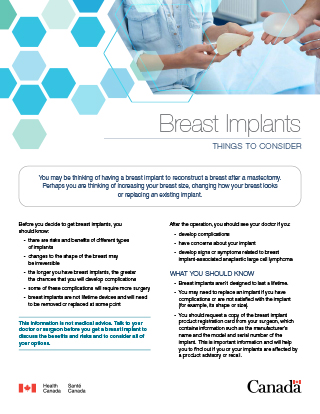Breast implants: Things to consider

Download the alternative format
(PDF format, 198 KB, 2 pages)
Organization: Health Canada
Published: 2024-08-XX
On this page
- If you're thinking about breast implants
- What you should know
- Some questions you can ask your surgeon before surgery
- Possible side effects
If you're thinking about breast implants
You may be thinking of having a breast implant to reconstruct a breast after a mastectomy. Perhaps you are thinking of increasing your breast size, changing how your breast looks or replacing an existing implant.
Before you decide to get breast implants, you should know:
- there are risks and benefits of different types of implants
- changes to the shape of the breast may be irreversible
- the longer you have breast implants, the greater the chances that you will develop complications
- some of these complications will require more surgery
- breast implants are not lifetime devices and will need to be removed or replaced at some point
This information is not medical advice. Talk to your doctor or surgeon before you get a breast implant to discuss the benefits and risks and to consider all of your options.
After the operation, you should see your doctor if you:
- develop complications
- have concerns about your implant
- develop signs or symptoms related to breast implant-associated anaplastic large cell lymphoma
What you should know
- Breast implants aren't designed to last a lifetime.
- You may need to replace an implant if you have complications or are not satisfied with the implant (for example, its shape or size).
- You should request a copy of the breast implant product registration card from your surgeon, which contains information such as the manufacturer's name and the model and serial number of the implant. This is important information and will help you to find out if you or your implants are affected by a product advisory or recall.
- You can also request a copy of the detailed breast implant information provided by the manufacturer to your surgeon.
- You and your surgeon should sign an informed consent form before any procedure takes place. This is important to acknowledge that your surgeon has explained the risks and benefits of the surgery and the implants.
- You should ask your surgeon to provide details of the surgery in a letter to your family doctor or health care provider. It's important to continue routine medical follow-up with a health care provider to detect any issues following surgery.
Some questions you can ask your surgeon before surgery
- What type of implant is the surgeon recommending and why?
- What other types of materials may be used in the surgery aside from the implant (for example, mesh, clips, patches)?
- What are the risks and possible side effects?
- What are the surgeon's credentials and experience with this operation and the surgeon's experience removing implants and scar capsules?
- What is the cost of the surgery?
- What are the future costs to remove or replace an implant?
- What are the future costs related to treatment of potential implant-related complications?
- When may replacement surgery be required?
Additional questions to ask your surgeon can be found here.
Possible side effects
Immediately following surgery:
- pain
- swelling
- bleeding
- infection
- changes in nipple and breast sensation
In some cases, more surgery may be required:
- to treat an adverse event following the initial procedure
- if you're dissatisfied with the size or shape of the implant
Some of the adverse events include:
- incorrect positioning of the implant
- rupture (the implant shell breaks or tears)
- tightening or hardening of scar tissue around the implant (called capsular contracture)
A person with breast implants may experience various symptoms or diseases, such as fatigue, problems with memory or concentration. There have also been reports of autoimmune diseases, which is when the body mistakenly attacks healthy cells, tissues or organs. These symptoms or diseases are sometimes referred to as breast implant illness. It's not yet understood whether or how these symptoms or diseases are related to breast implants.
On rare occasions, a person may develop breast implant-associated anaplastic large cell lymphoma (known as BIA-ALCL, which is a type of non-Hodgkin's lymphoma, a cancer of the immune system). Symptoms of BIA-ALCL can develop months or years after the implant surgery.
You should check your breasts regularly for any unusual changes, such as:
- sudden swelling or a lump
- redness, soreness or a rash
- dimpling, puckering or bulging of the skin
- a nipple that has changed position or an inverted nipple (pushed inward)
Discuss any signs or symptoms with your health care provider as soon as possible and report them to Health Canada.
Additional risks and possible adverse events can be found here. More information on BIA-ALCL can be found here.
Learn more about breast implants.